חַי הָאֲבָנִים הַמְּרַחֲפוֹת, בְּעֵת שֶׁמִּישֶׁהוּ נֶעֱלַם, הַבֹּקֶר הוּא סוּג שֶׁל מַכְאוֹב, כְּשֶׁפְּרִיחַת הָאֲפַרְסֵק מַאְדִּימָה טֶבַע יָפְיָהּ, כִּי הִיא מְרֻחֶקֶת אֳפָקִים מֵהָאֹשֶׁר
תרגום ועריכה מאנגלית לעברית המשוררת הבינלאומית: אִירִיס כָּלִיף
תרגום מסינית לאנגלית המשורר הבינלאומי: לִי פוקאנג
The international poet: Tang Shi [China]
A Quatrain (and other five poems)
,Flying Stones, When Someone Disappears
,Morning Is a Kind of Pain, When Peach blossoms Redden
For She’s Long Away from Happiness
Translation and editing from English to Hebrew by the international poet Iris Calif
:Translation from Chinese to English by the international poet
Li Fukang
אודות המחבר:
טָאנְג שִׁי, שם העט של ד"ר טאנג דרונג, הוא משורר ומבקר מוערך בסין, דוקטור לניהול, נשיא כבוד לכל החיים של מכון הקונפוציוס העולמי, יו"ר מרכז ההחלפות העולמי לאמנים ויזמים, זוכה מדליית התרבות והאמנות של האומות המאוחדות, נולד במחוז רונגצ'אנג, צ'ונגצ'ינג בשנת 1967. הוא פרסם יותר מ-20 יצירות על ספרות ואמנות, וניהול כלכלי. הוא העורך הראשי של "חקלאות פנאי ותיירות כפרית", שהיא אחת הסדרות של התחייה הכפרית ונכללת ברשימת הספרייה הכפרית הלאומית, ו"מדריך לסניף המפלגה הכפרית", שזכה בפרס 100 הספרים המוערכים על ידי המחלקה להסברה של הוועדה המרכזית ומשרד החקלאות וענייני הכפר. הוא זכה בפרס הבינלאומי היווני לספרות ואמנות, בפרס הישגי חיים של האומות המאוחדות בתחום התרבות והאמנות, בפרס האמנות הגבוה ביותר בעולם, ועוד.
:About the Author
Tang Shi, pen name for Dr. Tang Derong, is an acclaimed poet and critic in China, PhD in management, tenured honorary president of the World Confucius Institute, chairman of the World Exchange Center for Artists and Entrepreneurs, winner of the United Nations Medal of Culture and Art, was born in Rongchang District, Chongqing in 1967. He has published more than 20 works on literature and art, and economic management. He is the editor-in-chief of Leisure Agriculture and Rural Tourism, which is one of the series of rural revitalization and has among the list of the National Rural Bookstore, and Handbook on the Rural Party Branch, which won 100 Book Award appraised by Publicity Department of Central Committee and Ministry of Agriculture and Rural Affairs. He has been awarded Greek International Prize for Literature and Art, the United Nations Cultural and Art Lifetime Achievement Award, the World’s Highest Art Award, etc
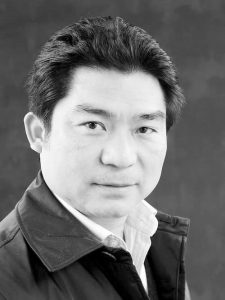

作者简介:
唐诗,本名唐德荣,1967年出生于重庆市荣昌区。中国当代著名诗人、批评家,管理学博士。系世界孔子学院终身名誉院长、世界文艺家企业家交流中心理事长等。获联合国文化艺术勋章。出版文学艺术、经济管理等各类著作20余部。主编《休闲农业与乡村旅游》系乡村振兴系列丛书之一,进入全国农家书屋,主编《农村党支部工作手册》获得中央宣传部、农业农村部评选的百种图书奖、文艺作品先后获希腊国际文学艺术奖、联合国文化与艺术终身成就奖、世界最高艺术殿堂奖等。
טָאנְג שִׁי [סִין]
שִׁיר שֶׁל אוֹת עוֹלָם הָאֲדָמָה בֶּן אַרְבַּע שׁוּרוֹת (וַחֲמִשָּׁה שִׁירִים נִלְוִים )
כְּשֶׁאָנוֹכִי מַרְכִּין רֹאשִׁי כְּעֵין כִּבְשָׂה, מִן הַנִּכָּר כִּי אָנֹכִי מִרְעֶה
כְּשֶׁאָנוֹכִי מַרְכִּין רֹאשִׁי כְּשֵׁם כִּבְשָׂה, דְּנַן כִּי אָנֹכִי בְּנוֹסְטַלְגִּיָּה, בְּחַג הוֹדָיַת לֵב
כְּשֶׁאָנוֹכִי צוֹנֵחַ רֹאשִׁי מָשָׁל כִּבְשָׂה, יִתָּכֵן כִּי מִן הַנִּמְנָע
שֶׁאָנֹכִי רוֹעֶה, וְכִי לֹא מִן הַנִּמְנָע כִּי אָנוֹכִי נָתַן (אֶת) דַּעְתּוֹ בְּאוֹת מִן הָאֲדָמָה הַגְּדוֹלָה
חַי הָאֲבָנִים הַמְּרַחֲפוֹת / טָאנְג שִׁי [סִין]
אֲבָנִים בְּכִפַּת הַשָּׁמַיִם אֵינָן נְמוֹטוֹת לְעוֹלָם לְתוֹכְכֵי אַשְׁלָיָה חֲשׂוּכַת הֲגִיג.
הֵמָּה כְּעֵין מִלִּים סְבוּכוֹת וַאֲבִיבִיּוֹת, שֶׁיֵּשׁ בְּעֹז נֹעַם כּוֹחָן לְרַחֵף מַעַל מְעוֹפָם
מֵאֲשֶׁר הָגוּיוֹת רַחֲבוֹת דַּעַת עוֹלָם. כְּמֶרְקַחַת שֶׁל לָבָן הָעֲנָנִים וּבָז שָׁחֹר,
הָאֲבָנִים הָרוֹחֲפוֹת מְסַרְבְּלוֹת לְכִפַּת הַשָּׁמַיִם הַדְּאוּבָה.
אָנֹכִי הַמְּיֻמָּן לָתוּר מִן הַסֶּדֶק שֶׁל טִפַּת גֶּשֶׁם
לְצִלּוֹ שֶׁל הַיָּם הַמַּשְׁקִיף, וּמִבֶּטֶן לִוְיָתָן כַּבִּיר, תָּר אַחַר
הַסְּפִינָה שֶׁנּוֹשֵׂאת עֲנָנִים חֶבְרָתִיִּים. אוּלָם עַתָּה אָנֹכִי מְאֹהָב
בָּאֲבָנִים הָרוֹחֲפוֹת, לְאַחַר שֶׁהוֹשִׁיעוּ לְתַאֲוַת הַתְּשׁוּקוֹת הָאֱנוֹשִׁיּוֹת, דְּבָרִים מְרֻבִּים,
שֶׁעֲתִידִים לְהִשָּׁקַע .נוֹצוֹת אֲוָז מְלִיטוֹת אֶת הָאֲדָמָה בְּעֵת שֶׁהָאֲבָנִים גּוֹאוֹת.
אֲבָנִים בַּיָּם, אֲבָנִים, עַל גַּב הַגְּבָעוֹת, אֲבָנִים בַּכְּפָר
אַבְנֵי הַהִיסְטוֹרְיָה, אַבְנֵי הָאֱנוֹשׁוּת… מְרַחֲפוֹת מֵעַל רָקִיעַ זְהַב כִּפַּת הַשָּׁמַיִם כְּעֵין נְשָׁרִים
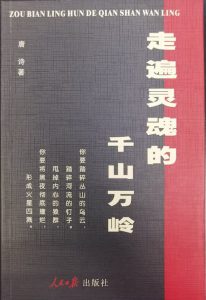

בְּעֵת שֶׁמִּישֶׁהוּ נֶעֱלַם / טָאנְג שִׁי [סִין]
בְּעֵת שֶׁמִּישֶׁהוּ פֶּתַע נָמוֹט
עֲנָנִים מֻחְשָׁכִים קְפוּאִים, חִישׁ מַהֵר אָצִים מֵעֲנָנִים לְבָנוֹנִיִּים לוֹטְפִים
נְהַר הַחַיִּים הֲפַשְׁתַּנִי
נִתַּז בִּזְעָקוֹת אֵנֶרְגֵּטִיּוֹת
סְגֻלָּתוֹ הַמֻּזְהֶבֶת ,נִבֶּטֶת
כְּלַהַט רוּחַ אָבִיב חֲמִימָה הַפּוֹשֶׁטֶת אֶל חַי הַמֶּרְחָבִים
מִגְרְעוֹתָיו הֵם כְּעֵין
עִשְׂבֵי הַבַּרְוָז הַמְּצַמְרְרִים שֶׁל הַקַּיִץ, הַמִּתְפַּזְּרִים בַּחֲטָף
בְּעֵת שֶׁמִּישֶׁהוּ נֶעֱלַם
בַּל יִתְחוֹלֵל בּוֹ מַכְאוֹב
אַף כִּי הַמַּכְאוֹב נְפָרֵט ל
יָפְיִי בַּר הַפְּרָחִים וְהִלַּת זָהוֹר הַיָּרֵחַ הַכּוֹרְכִים אֵלָיו בַּאֲדִיקוּת
כְּשֶׁעָשָׁן הַנְּשָׁמָה הַמְּיֻתָּם
מַפְצִיעַ מֵעֶלְיוֹן הָאֲרֻבָּה
מִיתָה וְאַגָּדָה שׁוֹקְלוֹת בְּיֶתֶר כְּבֵדוֹת מֵאֲבָנִים
וּבַל יִגְוָעוּ הֵן בְּלִוְיַת עַז מֵרְעֹד הָרוּחוֹת הַסּוֹמְרוֹת
וְכִי כָּךְ יֵשׁוּת תּוֹחֶלֶת חַיָּיו,
הֶאֱמִירָה לְמַעַל רָז הַפִּסְגָּה הָעִלָּאִית, הַבִּלְתִּי נִתְפֶּסֶת; מִקַּרְקָעִית לַמַּעֲלֶה
טָמִיר הַגֹּבַהּ הַנִּטְמָר שֶׁאֵלָיו בָּרוּא הָאָדָם מַרְקִיעַ
אֲשֶׁר יִנְחַל לְאַחַר שֶׁהוּא נֶעֱלַם
הַבֹּקֶר הוּא סוּג שֶׁל מַכְאוֹב / טָאנְג שִׁי [סִין]
הַבֹּקֶר הוּא סוּג שֶׁל מַכְאוֹב, כָּךְ גַּם גְּפָנִים סְגֻלּוֹת, זְהֹר הַשַּׁחַר
וּפְרָחִים שֶׁנַּשְּׁלוֹ טֶבַע יָפְיָם. כְּשֶׁאָנוֹכִי נִצָּב בַּמִּרְפֶּסֶת
חָבוּל מֵעֲבָרִי
טָעוּן בַּסִּיּוּט, שֶׁמִּישֶׁהוּ מַפְצִיר :"וְכִי מַדּוּעַ אָנֹכִי הַמְּיֹעָד לָחוּשׁ כְּנוּגֶה נֶפֶשׁ
עַל הָרָעָה הַנִּטְמֶרֶת בִּפְנִים"
וְכִי מַדּוּעַ עָלַי לָשֵׂאת אֶת הַקּוֹצִים הַמַּהֲלָכִים בְּרַעַם הַשַּׁאַג
מֵאַרְבָּעָה כִּוּוּנִים? וְכִי לָמָּה לְבַד
לְהִתְיַסֵּר מִגְּנֵבַת דַּעַת וּבְדִידוּת רוּחַ?
וְכִי מַדּוּעַ אָנֹכִי הוֹפֵךְ נִשְׁמָתִי מְעֻרְפֶּלֶת בְּעֵת שֶׁהַשָּׁמַיִם זוֹרְחִים
בַּל אָנֹכִי צוֹלֵחַ מַעֲנֵי, וְכִי הַמַּכְאוֹב עַתָּה חַי בְּתוֹכֵכִי
הַבֹּקֶר עֲדַיִן מֻקְדָּם…..
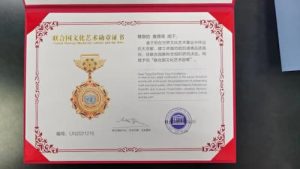

כְּשֶׁפְּרִיחַת הָאֲפַרְסֵק מַאְדִּימָה טֶבַע יָפְיָהּ / טָאנְג שִׁי [סִין]
כְּשֶׁפְּרִיחַת הָאֲפַרְסֵק מַאְדִּימָה אֶת טֶבַע יָפְיָהּ
הִנְּךָ בִּפְרִיחָה מְלֵאָה עַל הַלֵּב בְּעֵינַיִם מְשׁוֹלָלוֹת תַּחֲרוּת
הַכֹּל מִתְאַסֵּף בְּרֶגַע אֹשֶׁר הַפְּרִיחָה. בָּעֵת
שֶׁפְּרִיחַת הָאֲפַרְסֵק מַאְדִּימָה הִלַּת יָפְיָהּ , הִנְּךָ לֹא יוֹתֵר מֵחֲמִשָּׁה עֲלֵי פֶּרַח
שֶׁל אַהֲבָה, שֶׁל מַכְאוֹב, שֶׁל מָאוֹר, שֶׁל הַחֹשֶׁךְ, שֶׁל הַקְּרִיסְטָלִים.
הִנְּךָ מַאֲדִים בַּמֶּרְחָב הַנִּזְרֶה
בְּעֵת שֶׁפְּרִיחַת הָאֲפַרְסֵק מַאְדִּימָה, הִנְּךָ נֶהֱפַךְ לְלָבָן, אַגַּב
וּכְעֵין אָדָם מְהֻדָּר
פֶּתַע תּוֹהֶה עַל בָּרָק שָׁכִיחַ
כִּי הִיא מְרֻחֶקֶת אֳפָקִים מֵהָאֹשֶׁר / טָאנְג שִׁי [סִין]
בַּל אֶשְׁאַל אֶת הָעֲשָׂבִים הַשּׁוֹטִים
בְּזוֹ הָעֵת עַל תְּוַאי הַנִּכְאָבוֹת
וְכִי הִשְׁקִיף אָנוֹכִי
בַּפָּנָס הַמְּאַחֵז בַּשַּׁלְהֶבֶת הָעַזָּה, בַּמַּגָּע שֶׁל עֵץ הַמֵּיְפֶל
בְּתוֹכְכֵי גְּרָמֶיהָ שֶׁל צְפַרְדֵּעַ אַדְמוּמִית
מִזְדַּקְּפִים בְּצִדּוֹ הָאַחֵר שֶׁל הַסְּתָיו, שֶׁמֶשׁ וּתְמִיר קוֹל צִיּוּץ הַצִּפּוֹרִים אֵינָם צוֹנְחִים אֲנָכִית
וְכִי חָשׁ אָנֹכִי לֹא יוֹתֵר מֵאֲשֶׁר צְלִילָתָהּ שֶׁל הַשֶּׁמֶשׁ הַנִּטְבַּעַת
כִּפְרִי אֲפַרְסְמוֹן שֶׁנִּשְׁבָּה בָּאֹפֶק הָרוּחַ הָרוֹחֶקֶת. וּבְעֵת
שֶׁיֵּשׁ לִי הַיְּכֹלֶת לְהַרְחִיב בַּיִת צְעָדַי, מַחֲלִיט אָנֹכִי לְתוֹר
וּלְגַלּוֹת אַחַר מִי שֶׁרָחוֹק מֵאֹשֶׁר
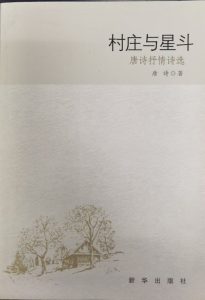

Tang Shi [China]
A Quatrain (and other five poems)
As I drop my head like sheep, it must be I’m grazing
As I drop my head like sheep, it’s me in nostalgia and thanksgiving
As I drop my head like sheep, it might not be
I’m grazing, it might be I notice the hint from the Great Earth
Flying Stones
Stones on the sky never fall into mindless illusion. They
Are like hard and fresh words, more capable of flying
Than deep thoughts. Mixture of white clouds and black falcon, the flying stones
Entangle the pained sky. I am used to seeking from the slit of a raindrop
The shadow of sea, and from the belly of a giant whale, seeking
The ship that carries social clouds. But now, I’m in love with
Flying stones, having rescued from human desires, many things
,bound to sink. Goose feathers cover the ground while the stones are rising. Behold
Stones in the sea, stones on the hills, stones in the village
Stones of history, stones of mankind… hovering over the sky like eagles
When Someone Disappears
When someone collapses suddenly
Icy dark clouds run faster than caressing white clouds
The shallow river of life
Splashes with vital cries
His golden virtue seems like
Warm spring breeze spreading around
His demerits are like
Summer’s chilling duckweeds dispersing fast
When someone disappears
There would not be any pain to him
Though pain spreads to
Flowers and moonlight closely associated with him
When a lonely wisp of soul’s smoke
Comes out of a high chimney
Death and legend weigh more than stones
Which did not perish with the chilling winds
His life span has thus
Risen to unfathomable top from the bottom
The height one can ascend to
.Comes after one disappears
Morning Is a Kind of Pain
The morning is a kind of pain, so are morning light, purple vines
and fallen flowers. As I’m standing at the porch
wounded by my past
loaded with nightmare, someone asks : “Why should I feel sad
about the evils inside
Why should I bear the thorns that come roaring
from four directions? Why alone
enduring deception and solitude? Why do I
turn obscure as soon as the sky shines
I would not answer, because the pain is still there
…The morning is still early
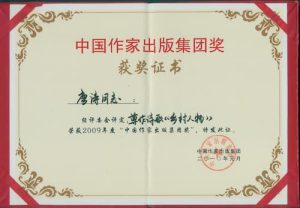

When Peach blossoms Redden
When peach blossoms redden
You’re in full bloom, on the heart, in the eyes, unmatched
All in bloom. When
Peach blossoms redden, you are no more than five petals
of love, of pain, of light, of dark, of crystals
.You go red in all directions
When peach blossoms redden, you become white incidentally
Like a gorgeous person
Suddenly thinking of an ordinary lightning 、
For She’s Long Away from Happiness
No longer would I ask the weeds
about the way to suffering
I have seen
a lantern holding flame tight, and a maple tree touching
the red frog inside its own bone
Standing on the other side of the fall, sunshine and bird twitter do not fall vertically
I feel nothing but a falling sun downsizing
like a persimmon fruit blown far away by wind. While
having somewhere to go, I decide to
find out the one who is
long away from happiness
(Translated by Li Fukang)
唐诗[中国]
四行(外五首)
我像羊一样低头的时候,一定是在吃草
我像羊一样低头的时候,是在感恩和怀念
我像羊一样低头的时候,不一定
在吃草,也许我注意到了大地的暗示
飞翔的石头
天上的石头,从不愿掉进无谓的遐想。它们
如坚硬而新鲜的语言,比深刻的思想
容易飞翔。白云和黑隼混合,飞翔的石头,把天空
绞得很痛。我过去习惯于在一滴水的缝隙
寻找大海的影子,在一条巨鲸的肚子里,寻找
装载过社会云朵的航船。而现在,我爱上了
飞翔的石头,人的欲望中,又挽救了多少本该
下沉的东西。鹅毛落满大地,石头却在上升。看吧
海的石头,山的石头,村庄的石头
历史的石头,人的石头……像群鹰一样在空中盘旋
当一个人消失的时候
当一个人突然倒下
冰凉的乌云比温情的白云跑得更快
生命浅浅的河流
溅起一阵旺盛的哭声
一个人金子般闪光的好处 此时
像遍布在周身的温暖春风
一个人的不足 此时
像夏天寒冷的浮萍迅速飘散
一个人消失的时候
那个人并不痛苦 痛苦的
是与那个人
有着密切关系的花朵和月光
当一缕灵魂的孤烟
缓缓地钻出一个高高的烟囱
死亡和传说比石头更沉重
并没有随冷风而逝
那个人的人生 已经
从底部升到了估计不准的顶部
一个人能达到的高度
往往在他消失之后
早晨是一种痛
早晨是一种痛,霞光是,紫藤是
落花也是。我伫立在长廊
浑身往事的伤
恶梦的重。有人在问:“我为什么要忧伤
这些身体里的坏”
为什么要容忍四面八方的刺
呼啸而来?为什么
独自承受欺骗和孤单?为什么天一亮
我就变暗了
我不想回答,因为痛还痛
…因为早晨还早
桃花红了的那会儿
桃花红了的那会儿
你正在盛开,心上的,眼中的,拔尖的
一齐绽放。桃花
红了的那会儿,你刚好五瓣
爱的,痛的,明的,暗的,净的
向各个方向展开
桃花红了得那会儿,你也偶尔白一下
像太鲜艳的人
突然想起:一道朴素的闪电
因为她离幸福太久了
我不再问那丛野草
去痛苦的地方往哪边走
我已经看见
灯笼抱紧了火焰,枫树摸到了
自己骨头里的红霜
站在秋天的对面,阳光和鸟声并不垂直而下
只感到落日越来越小
放佛被风吹远的柿子。而我
执意赶路,发誓
把这个人找出来,因为
她离幸福太久了
Iris Calif, Resident of the State of Israel, poet, writer, translator of poetry (to Hebrew), and dancer. Iris is also In charge of all foreign connection for the cultural and literature internet magazine "in direction of the wind", Writer, editor and translator Universal Poetry at "Mokasini" Magazine Culture & Lifestyle Magazine, Editor and translator in the "World Poetry" section of the literature website "Rooms"
member of the Composers' Association of Hebrew authors and publishers in Israel named “ ACUM. Iris is Award Winner of 2023: The International Best Poets & POETS: THE JOURNAL OF RENDITION OF INTERNATIONAL POETRY (ITRC)[Multilingual] [China]
The Board of Directors of World Union of Poetry Magazines
November 18, 2023
Iris was awarded a diploma from "The Russian Professional Writers Union" and the international magazine "Arina NN", registered in the Ministry of Culture of Russia for her contribution to world culture "International Poetic Community" 2022, and a member of the Association of artists and writers of the World SAPS
Iris is also serve on the editorial board of the World Poetry Yearbook 2024 (English edition)
She holds an honorary doctorate from the International Forum for Creativity, Humanity and Coexistence, Kingdom of Morocco
.Iris is 49 years old: married and mother of three daughters
:Her three books were publisher
In a fascinating (or magic) lane breathes (or blows) Lolita on On 2001
Wild moon on 2017, And The daughter of GOD on 2020.
She is currently working on her fourth book of scripture.
Her poems have been published on radio, television, magazines in Israel and abroad, literary websites in Israel and around the world Exhibited in Exhibited in prestigious exhibitions in Israel, the Internet and newspapers international, and have been translated by international poets into Spanish, Bengali, Chinese, Russian Turkish, Nepali, Assamese and Italian
Her poetry reflects the inner journey of her soul, which looks through love, dreams life, and breathes holy worlds, in the hidden spirit, and is a symbol and expression of her victory over Anorexia, and her choice of choosing life and love with courage
אִירִיס כָּלִיף
סופרת ,משוררת, רקדנית ,מתרגמת ועורכת שירה לעברית, אחראית על קשריי החוץ במגזין האינטרנטי לתרבות בכיוון הרוח ,כתבת, עורכת ומתרגמת שירה אוניברסלית במגזין לתרבות ולייף סטייל מוקסיני ,עורכת ומתרגמת במדור 'שירה עולמית' באתר הספרות 'חדרים'. חברה באגודת הסופרים העבריים בישראל ובאקו"ם.
איריס היא זוכת פרס המשורר הבינלאומי הטוב ביותר לשנת 2023 מטעם המרכז לחקר תרבות ושירה ITRC ]סין] מהדורה מעורבת של מגזין תרגום שירה בינלאומי של מועצת איחוד הפיוט העולמי נובמבר 2023 , בעלת דיפלומה מאיגוד הסופרים המקצועי הרוסי והמגזין הבינלאומי ארינה NN הרשום במשרד התרבות של רוסיה על תרומתה לתרבות העולם "קהילה פואטית בינלאומית" 2022 , היא חברה באיגוד האמנים והסופרים העולמי SAPS ,מכהנת כחברה במערכת שנתון השירה העולמית 2024 [מהדורה אנגלית] English edition World Poetry Yearbook 2024ובעלת תואר ד"ר לשם כבוד מהפורום הבינלאומי ליצירתיות, אנושיות ודו קיום ממלכת מרוקו.


ראו אור שלושת ספריה -"בשביל קסום נושפת לוליטה"/ 2001."ירח בר"/ 2017 ."בת אלוהים"/ 2020 ובימין אלו עובדת על ספרה הרביעי שבכתובים. שיריה פורסמו והוקראו ברדיו, בטלוויזיה, בכתבי עת ארציים ובינלאומיים ,אנתולוגיות בארץ ובחו"ל, אתרים ספרותיים ברחבי העולם, באינטרנט, הוצגו בתערוכות יוקרתיות בישראל, מגזינים ועיתונים עולמיים ותורגמו ע"י משוררים בינלאומיים למגוון של שפות ,ספרדית, בנגלית, נפאלית, סינית, טורקית, אסמית, רוסית ואיטלקית, שירתה של איריס משקפת את מסעה הפנימי של נפשה המביטה אהבה, החולמת חיים והמנשמת מחול עולמות קודש בריאה ונסתר ומהווה סמל וביטוי לניצחונה על מחלת האנורקסיה ובחירתה באומץ של חיים ואהבה.


תעודת הוקרה של הפורום הבינלאומי ליצירתיות ואנושיות מטעם ממלכת מרוקו על תרומתה של המשוררת איריס כליף בתחום התרבות, האומנות, היצירתיות, האנושיות והפצת השלום.
















































הוספת תגובה